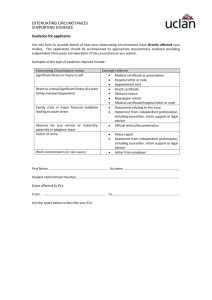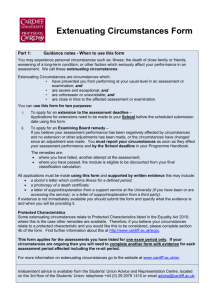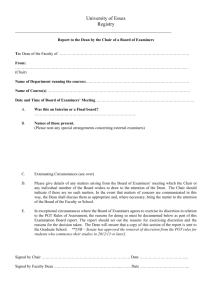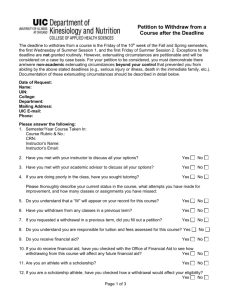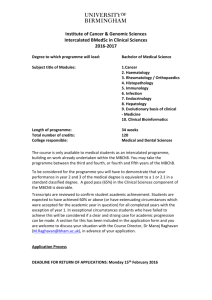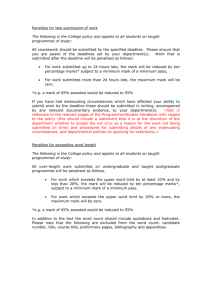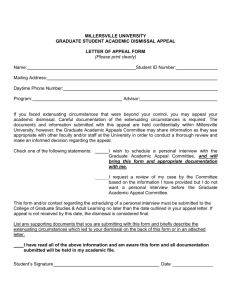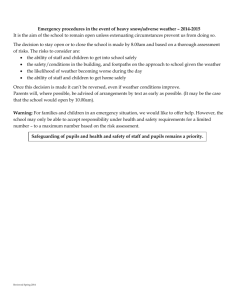Extenuating Circumstances procedures
advertisement
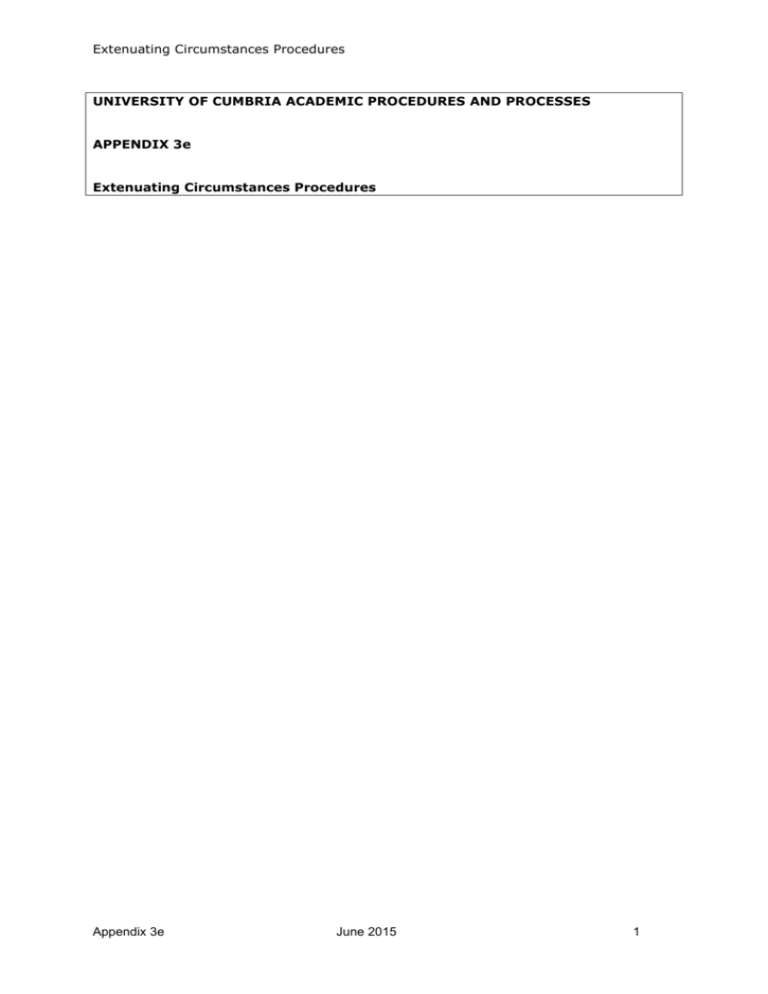
Extenuating Circumstances Procedures UNIVERSITY OF CUMBRIA ACADEMIC PROCEDURES AND PROCESSES APPENDIX 3e Extenuating Circumstances Procedures Appendix 3e June 2015 1 Extenuating Circumstances Procedures Extenuating Circumstances Procedures 1. General principles 1.1 University regulations (Section F12) allow students to formally draw to the attention of Assessment Boards any extenuating circumstances they feel have significantly affected their study and/or performance in assessments. The onus for reporting and providing corroborating documentary evidence of the extenuating circumstances lies with the student. Assessment Boards take all valid submissions into account when determining progression and awards to ensure as far as possible that all students are assessed upon equal terms. All claims are treated confidentially. 1.2 The Extenuating Circumstances scheme, which applies to all students, is intended to provide a confidential and fair process for managing Extenuating Circumstances. The Scheme does not apply to the day-to-day level of requests for extensions or other matters which can (and should) be dealt with at the time by programme/module tutors. 2. Defining Extenuating Circumstances 2.1 Extenuating circumstances personal to the student 2.1.1 ‘Extenuating Circumstances' are serious and exceptional circumstances outside the student’s control, normally unforeseeable and unpreventable, which the student feels have significantly adversely affected their ability to study and/or performance in assessment. They are often medical or serious personal family or domestic difficulties and have usually arisen since they started the programme. The circumstances may have affected the student for a significant period of time and/or at a particular point in time such as during the examination period, preventing the student from attending examinations or other timed assessments, or submitting assessments by the due date. 2.2 Types of situations likely to be valid Extenuating circumstances 2.2.1 Examples are: i. Identification or acquisition of disability/mental health condition not declared or known to the University with the necessary level of appropriate evidence ii. Serious ill health or substantial changes to the impact of known disability and/or chronic medical condition affecting academic performance at a critical point in the assessment calendar or over a sustained period of time (eg 6 months) iii. Personal accident or injury iv. Death or serious illness of family members or close friends v. Major household problems e.g. fire vi. Acute personal or emotional trauma, e.g. acute anxiety or depression, family breakdown, breakdown of close personal relationship vii. Major and unplanned changes to employment circumstances or patterns of employment (EXCEPT Full Time Students) viii. Impact of natural disaster, civil disruption or other major hazard. Appendix 3e June 2015 2 Extenuating Circumstances Procedures 2.2.2 Whilst Extenuating Circumstances are personal, there may be situations in which a personal effect has been experienced by a group of students (for example the death of a fellow student on the programme). In these cases, while the circumstances are clear and common to all, the impact is individual and would require individual claims. 2.3 Circumstances not likely to qualify 2.3.1 These include everyday, avoidable occurrences, and normal student pressures such as: i. Colds or known conditions such as hay fever (unless the effects are unusually severe) ii. Normal exam stress or anxiety experienced during revision or the assessment period (unless corroborated by medical evidence as a chronic condition and undergoing treatment) iii. Non-serious domestic or personal disruptions (e.g. moving house, change of job, holidays, weddings, normal job pressure, failed travel arrangements, financial difficulties, oversleeping) iv. Work commitments in the case of full-time students v. Study related circumstances (equipment failure including computing/printer difficulties (unless they occur in an examination itself)), failure to have taken back up copies for work stolen or corrupted, bunching of deadlines/examinations, missing books, poor time management, misreading the examination timetable, taking the wrong examination). 3. Extensions of time 3.1 Students are responsible for submitting work for assessment by the deadlines specified. Where a student knows that for good reason they are going to have a difficulty in submitting work by the due date (e.g. because of sickness), a request for an approved extension of time should be made (see Appendix 3c, 2.6). The Extenuating Circumstances scheme should not be used in these circumstances as the situation has been managed in advance of the impact occurring except where extenuating circumstances which prevented submission arose after the extension was approved. 3.2 Approved extensions of time will normally be applied on a time lost basis, normally up to 2 weeks (14 days including 10 working days). Extensions beyond 2 weeks may be given in exceptional circumstances but no extension may be given beyond the date of the Module Assessment Board. Programme Leaders should ensure that the extension of time granted is consistent across the programme according to the circumstances presented by students. Any extension agreed should still permit the assessment item to be marked and presented to the Module Assessment Board and as a result extensions should not normally be granted beyond the end of the last week of the academic session in which the work is due to be submitted or the date when feedback relating to the assessment is issued to the student cohort. 4. Extenuating circumstances affecting groups of students 4.1 Particular conditions (e.g. disruption in an examination due to noise or computer problems, staff illness during the study period, procedural errors) may affect groups of students and their performance. Such problems should be identified by Appendix 3e June 2015 3 Extenuating Circumstances Procedures the Invigilator or member of staff and reported to SAMIS who is responsible for reporting the details to the Module Assessment Board. The nature of the event, the length of time it extended over, the students/module affected and action taken/recommended (for example adjustments to the marks following discussion in the moderation process) should be indicated. The MAB will then act to take action en masse where justified. The Programme Leader should inform students that the University will initiate the relevant action so avoiding the need for multiple individual submissions by students. 4.2 Such instances must be reported to UAB by the Chair of MAB. 5. Evidence required to support claims for extenuating circumstances 5.1 Students must keep their Personal Tutor informed of any adverse personal circumstances. All claims for consideration of Extenuating Circumstances must be supported by documentary evidence. 5.2 If an examination is missed due to medical problems the student must attempt to seek medical attention on the day, and attach a medical certificate to the claim. Medical certificates dated days later may not be regarded as sufficient evidence. The certificate must relate specifically to the time of the illness and must contain a clear medical opinion that the student was unfit to take the examination. 5.3 The nature of some personal extenuating circumstances can make it difficult for a student to obtain external corroboration and, in exceptional cases, evidence of detailed discussion with, and provision of, a detailed written statement from the Programme Leader, Personal Tutor, LiSS Advisor or other recognised formal student support role, may provide appropriate evidence in specific cases. 6. The Process 6.1 The Extenuating Circumstances Panel 6.1.1 Claims and the evidence submitted are considered by a Panel of the University Assessment Board which meets before the Board sits to determine whether the claim is valid or not, and in doing so, it will confirm concurrency of dates of ECs and module delivery to the UAB. The Panel is chaired by a Deputy Dean, Associate Dean or Director of Institute of Education, or an appropriate nominee (at Principal Lecturer scale or above), and serviced by a representative from SaMIS. 6.1.2 The Panel is drawn from a pool of members of academic staff. Ten members (three of whom will be at Principal Lecturer scale or above) will be nominated for the pool by the Executive Dean and approved by Academic Board on an annual basis. The Panel will not have the student marks available at the meeting. A claim judged as valid is approved and accepted as having an effect on performance. The module(s)/parts of the module(s) affected will be specified. 6.1.3 The Panel shall comprise the Chair and two members taken from the pool, together with the appropriate secretarial support. 6.2 Action by the University Assessment Board 6.2.1 The Extenuating Circumstances Panel’s decisions, but not the detail of the claims, are reported to the Module Assessment Board which makes recommendations to the University Assessment Board. The University Assessment Board takes the claims into account when considering the student’s performance in the module, progression or award, and can use its discretion as follows. Appendix 3e June 2015 4 Extenuating Circumstances Procedures i. For undergraduate credit only, to waive the assessment requirement. Up to 20 credits per 120 at each of levels 3 and 4 and 20 credits across levels 5 and 6, (and 10 credits where the credits are between 60 and 120) can be waived where: a. the module is not core and professional body requirements do not prohibit this b. offering deferred assessment would be inappropriate or disadvantageous c. and there is evidence that the learning outcomes for the module have been studied and that the learning outcomes for the programme can be met. A module pass is awarded, and at award level, the module is removed from the classification average calculations (Regulations F 13.3 – 13.4). [Note: Waiver is not possible for 60 credit awards]. ii. To void the assessment and offer the student a first attempt (first sit) so replacing the previous attempt. Where the student cannot be advantaged by voiding the assessment the Board will use its discretion and normally will not offer a void. iii. To construct an assessment contract where the circumstances affect more than 40 credits worth of assessed work. This sets out the new dates for completion of the work specified. The normal reassessment attempts will apply. 6.2.2 The Board will have access to a representative from the Panel and the record of its discussion and recommendations for clarification if need be. 7. The Procedure 7.1 Notification and submission of student claims 7.1.1 The student completes the Extenuating Circumstances form entering details of the work affected and the nature of the claim, and attaches relevant documentary evidence such as medical certificates. In the case of ongoing circumstances the student shall be required to apply for Extenuating Circumstances annually as the impact on assessment may differ throughout the programme. The form is submitted to the SaMIS in the special envelopes marked "Extenuating Circumstances" available from SaMIS Offices at the earliest possible date and normally within 5 working days of the last assessment for the module (see separate schedule of assessment period and Assessment Board meetings). SaMIS issues receipt, logs receipt of submission and maintains a secure confidential file. 7.1.2 Claims and evidence provided retrospectively will not normally be accepted unless there is good reason why they could not be submitted as expected. 7.1.3 For partnership students, written submission is made to the approved partnership office (as identified in the Memorandum of Cooperation) which is responsible for ensuring that individual submissions are transmitted to the SaMIS Office of the University. 7.1.4 In exceptional cases where a student is incapacitated, the form may be completed on his/her behalf by a member of staff. The form must be signed by the member of staff and include the capacity in which they are acting (e.g. Personal Tutor, Programme Leader). Appendix 3e June 2015 5 Extenuating Circumstances Procedures 7.2 Processing 7.2.1 Members of the Course Information Point (CIP) are responsible for processing the claims received, and forwarding them to the Panel. Details of the claims to be considered by the Panel should be entered on the Record of Claims Proforma. 7.3 Consideration 7.3.1 The Panel will consider the claim and the evidence and decide whether to accept or not accept it, determining whether the circumstances are likely to have significantly affected the student’s performance. 7.3.2 An accepted claim is automatically recorded on SITS. 7.4 Action by the Assessment Board 7.4.1 The University Assessment Board is notified of valid claims and can use its discretion to recommend: waiving the assessment requirement (for undergraduate credit only); voiding the assessment and offering the student the opportunity to reattempt the assessment; or constructing an assessment contract where the circumstances affect more than 40 credits worth of assessed work. (The contract will be devised by the Programme Leader and agreed with the Chair of the UAB by Chair’s action once it has been discussed with the student. Details of the contract and the new requirements/ dates for completion will be reported to the UAB.) Details will be recorded on the student’s record and the Student Record System. 7.4.2 Where there are extenuating circumstances affecting groups of students e.g. disruption in an examination, then this should be reported to the Module Assessment Board which will consider the circumstances and make any adjustment to marks accordingly. The action should be reported to the University Assessment Board. 7.5 Notification of Outcome to Students 7.5.1 Following the University Assessment Board, students will be notified via a transcript indicating the outcome of the claim i.e. whether accepted or not, and the consideration given by the University Assessment Board. 8. Confidentiality 8.1 Students may not wish to discuss their situation with someone connected with their programme. They have the right to report their circumstances in confidence to an independent person such as a student counsellor in LiSS or staff in the Students Union Advice Centre. 8.2 Where appropriate, counsellors can provide corroborating evidence for students indicating that the student has been attending for counselling, the date of first attendance and the number of consultations, and can give their professional opinion as to whether the circumstances are likely to have affected a student's academic performance. However, counsellors are not able to give details about the consultations themselves and it is the student's responsibility to make the nature of the circumstances known in their individual submission. It is also understood that sometimes circumstances can be very personal and that students may not wish the details of their case to be discussed. In this case, the student Appendix 3e June 2015 6 Extenuating Circumstances Procedures should mark the envelope containing the claim ‘for the personal attention of the Chair of the Extenuating Circumstances Panel’. 8.3 Where other LiSS professionals submit evidence alongside a student’s claim, the Board may contact the person named supplying the evidence if further information is required. 9. Review of the Procedures The University reviews these procedures periodically. Appendix 3e June 2015 7
